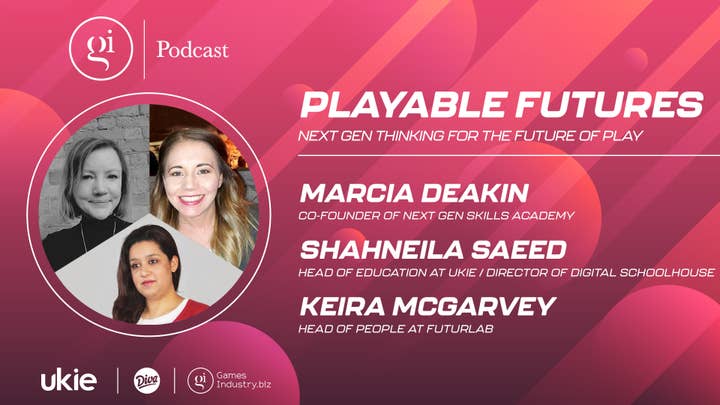The future of talent pipelines into games | Playable Futures Podcast
Latest episode considers the future talent pipeline for the games industry and how we join the dots between industry and education
Sign up for the GI Daily here to get the biggest news straight to your inbox
Episode six of the Playable Futures podcast assembles a panel of experts to tackle the challenges and opportunities of the industry’s talent pipeline, and how the sector finds itself at a crossroads in terms of future proofing recruitment for the medium and long term success of the sector.
Next Gen Skills Academy co-founder Marcia Deakin, UKIE head of education and Digital Schoolhouse director Shahneila Saeed, and Futurlab head of people Keira McGarvey join Will Freeman to discuss the future talent pipeline for the games industry and how we join the dots between industry and education.
You can listen to the episode in the player below or download the file directly here – and scroll down for some of the episode's highlights.
Despite there being numerous high-quality university courses geared around industry specialisms, the industry repeatedly encounters challenges filling junior positions, as well as a skills gap at more senior levels, too. This Playable Futures panel looks at what’s causing this and offers many positive and thoughtful solutions for the future and discusses how the sector will benefit from a wider and more diverse workforce.
A growing industry with mass appeal would, perhaps at first glance, seem like one brimming with opportunities, but it isn’t necessarily that simple, as Next Gen Skills Academy’s Marcia Deakin explains:
"We don’t have enough people with the right skills coming into the industry"
Marcia Deakin, Next Gen Skills Academy
“The games industry has long had challenges with the talent pipeline. We don’t have enough people with the right skills coming into the industry… In terms of entry level roles, there are lots of people who want to come in and we have lots of universities and colleges producing talent for us, but they don’t always have the right skills further up the talent pipeline.”
While there are clearly challenges around getting the right talent into the industry, raising awareness among young people that a career in games is a viable option is especially important.
As Head of Education at UKIE, Shahneila Saeed works with schools and colleges to raise awareness of opportunities within the creative digital world. For her, part of the solution is joining the dots between education at different levels and the games industry.
“It’s really important - getting industry and educators to talk to each other so that we can share that knowledge and expertise. Each is an expert in their own right. It’s about enabling people to come round the table to that, we can bridge that gap and share that learning.”
FuturLab’s Keira McGarvey goes on to discuss the disconnect between suitable talent, interest in joining the industry and skill development, and how organisations like IntoGames are trying to address this and explains that whilst there’s no shortage of people who want to come into the industry, new starters don’t always come equipped with the skills to either jump right in, or progress up the talent pipeline. One solution is to open up opportunities to young people far earlier - and not just limiting these to people in further education:
“Right now [the sector is] very limited to people who have a further education to break into the industry in even a junior role. If we start earlier – in early education – people who don’t have the ability to go to university or college won’t find it a blocker for them getting into an industry or a career that they want to fulfil.”
" If we start in early education, people who don’t go to university or college won’t find it a blocker for them getting into the industry"
Keira McGarvey, FuturLab
The panel also discuss the opportunities that come by more employing people who come to the sector via non-traditional routes or indeed from more diverse backgrounds:
“There’s a huge potential. If you have a more diverse workforce, you actually have better productivity. You’re drawing from a deeper talent pool, you’re more culturally sensitive, you’re building better teams and have improved employer retention and motivation. It’s amazing that, as an industry, we are popular right across all different kinds of people and we need to promote that and promote ambition.”
The panel reveals the huge, positive potential of the talent pipeline as well as tactics and solutions to manage it in the long term, and a cognisance of how the sector can diversify to improve. After all, it’s a great problem to have, right? There’s no shortage of roles and people to fill them, and a strong foundation for education and training. The benefits of a well-nurtured talent pipeline are growth, innovation and creativity for generations to come. The challenge now lies in joining the dots.
The Playable Futures Podcast accompanies Playable Futures, a collection of insights, interviews and articles from global games leaders sharing their visions of where the industry and medium will go next. A series of ten articles so far have been published on GamesIndustry.biz, with more planned. Playable Futures is a collaborative project brought to you in partnership with GI.biz, UKIE and Diva.

